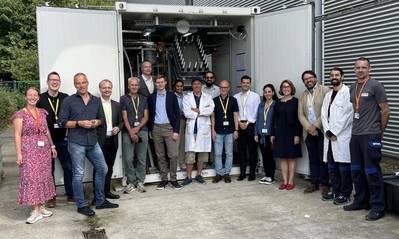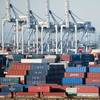CO2 Electrolyzer Development Aims to Promote Green e-Fuel Production
The ECO2Fuel project is testing a prototype direct, electrochemical CO2 conversion system that produces sustainable liquid e-fuels and chemicals such as methanol and ethanol.
The aim is to scale the system up to achieve the world’s first low-temperature 1MW CO2 electrolyzer in 2026.
The ECO2Fuel system works by directly reducing CO2 through electrocatalytic conversion in a single-step process. This process uses water and renewable electricity, without the need for hydrogen. The operation is performed under low temperatures and pressures, below 80°C and 15 bar respectively.
The impetus for the project is the European Green Deal’s ambitious targets for climate neutrality by 2050, including the goal to achieve a 55% reduction in greenhouse gas emissions by 2030. Achieving this is likely to require the development and wider adoption of advanced carbon capture and utilization technologies.
The project is funded under the Horizon Europe program, and the project team has developed one of the world's first large scale CO2 electrolyzers – with a total active area of 3.75 m². A system of this size necessitated a cell design of 1500cm² which exceeds most currently used. For the 50kW stack, in total 25 cells of 1500cm² are used, which creates a total area of 3.75m². The 1500cm² cell equals the current state-of-the-art in PEM (proton exchange membrane) water electrolysis.
Key to its operation, the system reuses the specific mixture of gases generated at the negative electrode (the cathode), which can significantly improve the conversion of CO2 into new valuable products.
CO2 electrolyzer stack characteristics include a rectangular shape with crossflow design for extra degree freedom, the possibility for direct water injection and suitability for gas or liquid processes.
The 50kW stack electrolyzer is being tested at the VITO site in Belgium where the research team is ensuring the system's efficiency, focusing on the electricity conductivity of the membranes, the chemical conversion process and overall system stability.
Scaling up the system is a key objective of the project, with the aim of testing it at 1MW scale on the RWE site in Germany by 2026.
The project brings together a coalition of businesses and research institutions: Deutsches Zentrum für Luft-und Raumfahrt e.V. (DLR), RWE, Bekaert, De Nora, HyGear, ARIEMA, Energía y Medioambiente S.L., Monolithos Ltd., HYDROLITE, Think11, META Group, CENTRO RICERCHE FIAT SCPA, DTU – Technical University of Denmark, Universitat Politècnica de València (UPV), Consiglio Nazionale delle Ricerche (CNR), and VITO.














